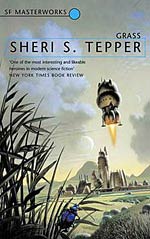
![]() couchtomoon
couchtomoon
11/25/2015
![]()
A planet of rainbow meadows! Rippling grass plains of psychedelia! It's a setting ripped straight from my '80s cartoon-fueled childhood fantasies. With a one-word, exclamatory opening ("Grass!"), followed by rhythmic, semantically-repetitive exaltations of unworldly beauty of this agro-fantasy landscape, it brings to mind the overzealous theme chorus of Hair,the musical, (am I the only one?)
...and a very contrary feeling of eerie disquiet that never goes away...
Tepper turns menacing an innocuous setting from the first word. The cultish chant of excessive descriptors, like a chime of empty rhetoric interrupted by not-so-hints of social instability and injected references to blood, silver, and stubble suggest an insidious nature. At the bottom of the page, a little girl asks, "What are nuns, Grandma?" The next page over, she doesn't recognize a parsnip. All followed by a quickening sense of archaic aristocracy and oppressive tradition, but really, what is this place?
And that's the essential mystery of Sheri S. Tepper's SF Masterwork novel.
(But thank goodness we get to leave that weird hippie-elite merged nightmare by chapter 3 for something more comfortable: a gritty urban techno-setting of poverty and tyranny. With spaceships! But we won't be there for long... discomfort is the game in Grass.)
Marjorie's husband is assigned to investigate a cure on the plagueless planet of Grass, with kids, horses, and husband's mistress in tow, while the rest of the human universe succumbs to sickness. The dichotomous social structure of the planet baffles Marjorie--a hushed nobility over here, a vibrant merchant class over there--not to mention the sinister "mounts" and "hounds" that lead the "hunt. When a young girl disappears and society looks the other way, Marjorie risks her life, as well as her diplomatic position, to shatter the suffocating silence of the Grassian elite
Here be monsters: the hounds, horse-sized, "the nighttime horror, the eater of young," (2) and the mounts, or Hippae, "twice the size of the hounds... those necks spined with arm-long scimitars of pointed, knife-edged bone..." (82). These are frightful beasts, but there's also something sexual about the human-mount relationship with the strained, erect posture to avoid those barbs, the "simulator" they use for strengthening the thighs and back, and the lulling, rhythmic hypnosis of the ride. A social obsessiveness pervades these hunts, yet secrecy envelopes the act. It feels drug-like, carnal, impure.
Other subplots thicken the tale. The acolyte Rillibee is reassigned to a Friary on Grass, despite his internal blasphemies. Marjorie and husband wrestle with physical and emotional intimacy, further impaired by the presence of his mistress, and a younger male love interest. Marjorie's daughter is desperate to win the affections of an older Grassian aristocrat. Meanwhile, tensions between the Terran-based empire, Sanctity, and the insular planet of Grass threaten the possible discovery of cure for the plague.
The theme is Taboo. So much unknown, so much unsaid. Taboo saturates Tepper's universe. But things-being-unsaid doesn't quite work when the author pans a conveniently trained lens on the internal worlds of every important (and not-so-important) character. Too often, intimate tension is revealed for the sake of the reader and to the detriment of the mystery. Head-hopping thoughts are exposed, while enigmatic characters are laid bare as simple and predictable. The domineering beasts of Grass are spared this internal vivisection (for the most part), and remain the only real force for page-turning in this layered tale.
At times, hairy situations are rescued by unlikely, convenient things: a slip of paper drops in just the right place, characters show up at just the right time. (At one point, I wonder if Rillibee has access to a teleport, considering his talent for fast and prompt travel.) Then, on page 343 of the 450-page tale, the only medical doctor on Grass, a multi-degreed female with research and publishing credits on her CV asks, "Why didn't you ask us medical people?" (343). Well, yes. I kind of wondered that, too.
There's something arbitrary about a planet-sized nation-state, feudal-state, culture, et cetera, and spacefaring races that regress technologically inevitably raise red skeptic flags, but I'll forgive it in the name of metaphor, which is worth the parsing out, though, fair warning, a planet of rippling, rainbow-colored grass insulated by generations of taboo and tradition, and submissive to the forces of pernicious, untamed beasts might be muddier than the surface elements suggest.
A very odd and hard-to-categorize SF novel.
http://couchtomoon.wordpress.com